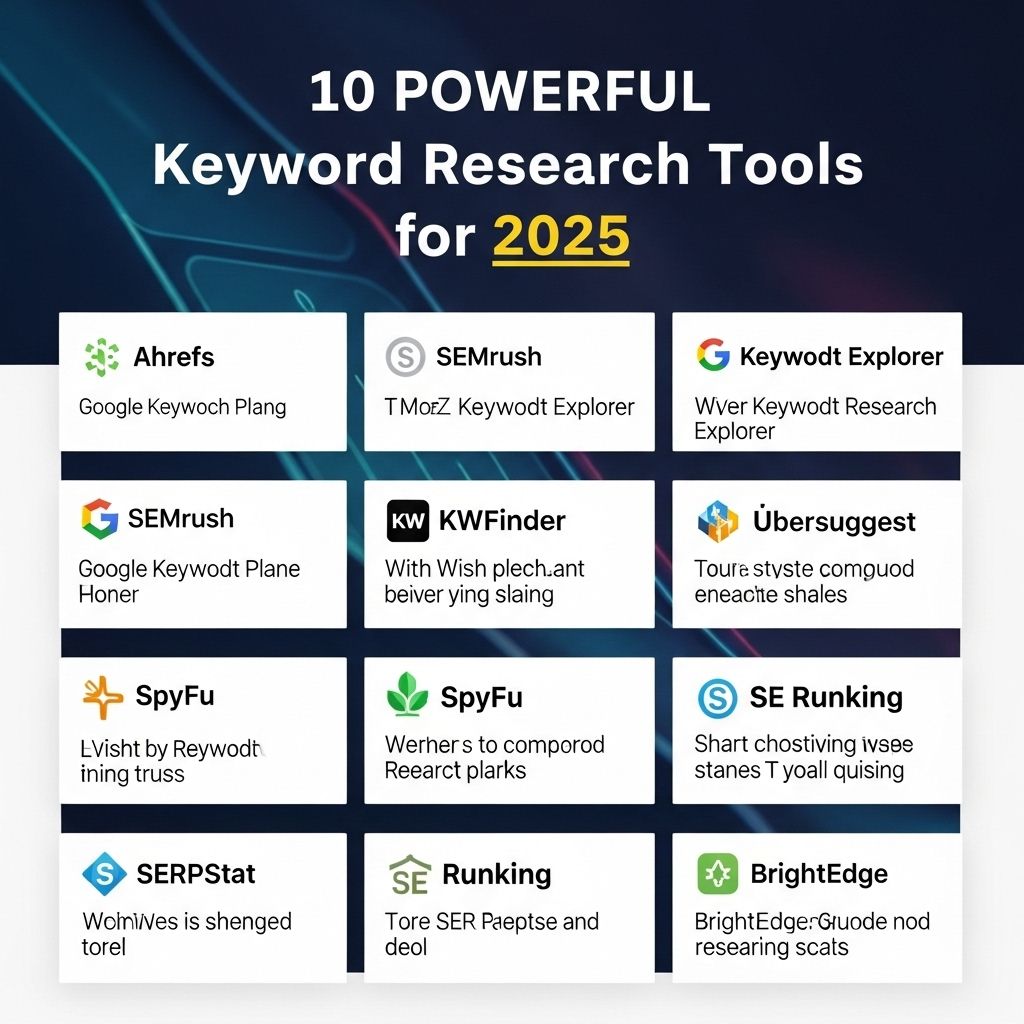As the digital landscape continues to evolve, the importance of keyword research remains paramount for marketers, bloggers, SEO professionals, and content creators alike. In 2025, with the rise of AI-driven content generation and the constant updates to search engine algorithms, having the right tools at your disposal can make all the difference in achieving online visibility and attracting organic traffic. This article will explore ten powerful keyword research tools that can help you stay ahead of the competition in the coming years.
Table of Contents
Understanding the Importance of Keyword Research
Keyword research is the process of identifying and analyzing the search terms that people enter into search engines. This process is crucial for several reasons:
- SEO Optimization: Identifying the right keywords helps optimize content for better rankings.
- Content Strategy: Knowing what your audience is searching for allows for more relevant and engaging content.
- Competitive Analysis: Understanding keywords can aid in assessing competitive landscapes.
- Ad Campaigns: Targeting the right keywords can improve the effectiveness of PPC campaigns.
Top 10 Keyword Research Tools for 2025
Below is a detailed overview of ten keyword research tools that stand out for their features, usability, and results.
1. SEMrush
SEMrush is a comprehensive SEO tool that includes advanced keyword research capabilities. Its features include:
- Keyword Magic Tool: Access millions of keywords to find the best options.
- Keyword Difficulty: Analyze how hard it is to rank for specific keywords.
- Competitive Analysis: See which keywords your competitors are targeting.
2. Ahrefs
Ahrefs is another powerful tool that excels in providing keyword data based on search volume and difficulty. Key features include:
- Site Explorer: Analyze your website’s performance and discover new keywords.
- Keyword Explorer: Get metric insights into potential keywords.
- Content Explorer: Find trending content based on specific keywords.
3. Google Keyword Planner
As a free tool provided by Google, the Keyword Planner is ideal for PPC advertisers but also valuable for SEO:
- Search Volume Data: Access monthly search volumes and forecasts.
- Ad Group Ideas: Generate ideas for ad groups based on keywords.
4. Ubersuggest
Ubersuggest offers a user-friendly interface with solid keyword data:
- Keyword Suggestions: Find hundreds of related keywords.
- SEO Difficulty Checker: Understand how hard it will be to rank for selected keywords.
5. AnswerThePublic
This tool provides unique insights into the questions and phrases people are searching for:
- Visual Data Representation: See keyword data in visual format.
- Content Ideas: Generate ideas based on user queries.
6. Moz Keyword Explorer
Moz’s tool offers a wide range of keyword metrics:
- Keyword Suggestions: Find new keywords with search volume data.
- Difficulty Score: Analyze how difficult it will be to rank for specific keywords.
- Opportunity Insights: Determine which keywords could drive traffic.
7. Soovle
Soovle is a unique tool that aggregates keyword suggestions from multiple search engines:
- Multi-Platform Suggestions: Get keyword ideas from Google, Bing, YouTube, and more.
- Real-Time Data: See suggestions as you type.
8. Keyword Tool
Keyword Tool helps generate long-tail keyword suggestions:
- Google Autocomplete: Use Google’s suggestion feature for keyword ideas.
- Multiple Language Support: Generate keywords in various languages.
9. Keywords Everywhere
This browser extension provides keyword data directly in search results:
- Search Volume Insights: View monthly search volume, CPC, and competition data.
- Easy to Use: Conveniently integrated into your browsing experience.
10. SpyFu
SpyFu specializes in competitive keyword analysis:
- Competitor Insights: Discover which keywords your competitors are bidding on.
- Keyword Grouping: Organize keywords into manageable groups for easier analysis.
Choosing the Right Tool for Your Needs
When selecting a keyword research tool, consider several factors:
- Your Budget: Some tools are free, while others require a subscription.
- Your Goals: Are you focused on SEO, PPC, or both?
- User Interface: Choose a tool that feels intuitive and easy to navigate.
- Data Accuracy: Look for tools that provide reliable data.
Maximizing the Use of Keyword Research Tools
To get the most out of these tools, follow these best practices:
- Regular Analysis: Make keyword research a consistent part of your content strategy.
- Experiment with Variations: Try different keyword combinations to see what works.
- Monitor Trends: Stay updated on changes in search behavior and adjust your strategy accordingly.
Conclusion
In the ever-changing digital marketing landscape of 2025, staying equipped with the right keyword research tools is essential for success. By leveraging the features of these ten powerful tools, you can optimize your content, improve your SEO strategy, and outperform your competitors. Make keyword research a priority in your digital marketing efforts to ensure sustained growth and visibility in the years to come.
FAQ
What are the best keyword research tools available in 2025?
Some of the best keyword research tools in 2025 include SEMrush, Ahrefs, Google Keyword Planner, Moz Keyword Explorer, Ubersuggest, and Keywords Everywhere.
How can keyword research tools help improve my SEO strategy?
Keyword research tools help identify high-volume, low-competition keywords, enabling you to optimize your content and attract more organic traffic to your website.
Are there free keyword research tools I can use in 2025?
Yes, tools like Google Keyword Planner, Ubersuggest, and AnswerThePublic offer free versions that can be useful for keyword research.
What features should I look for in a keyword research tool?
Look for features such as keyword suggestions, search volume data, keyword difficulty scores, competitive analysis, and trend tracking.
How often should I conduct keyword research?
It’s recommended to conduct keyword research regularly, at least every few months, to stay updated with changing trends and to optimize your content accordingly.









